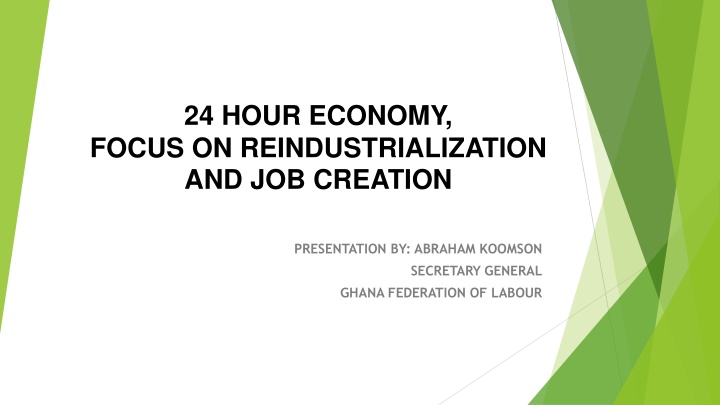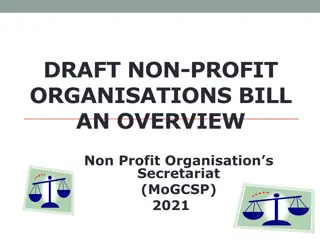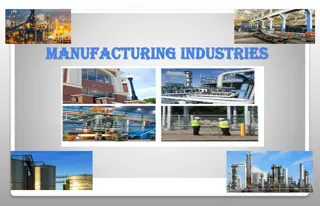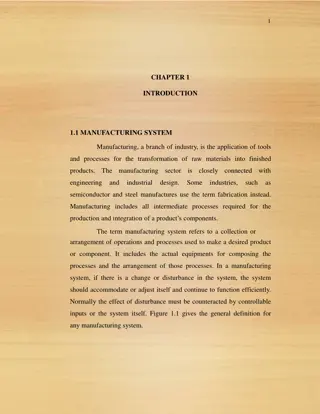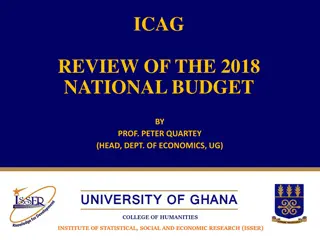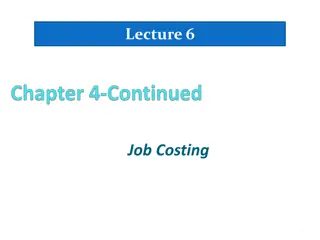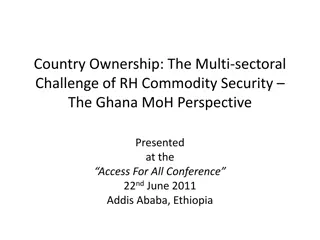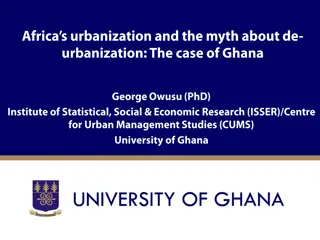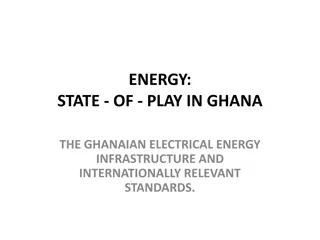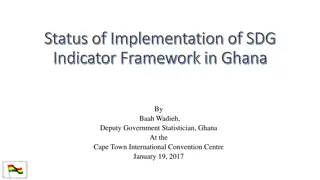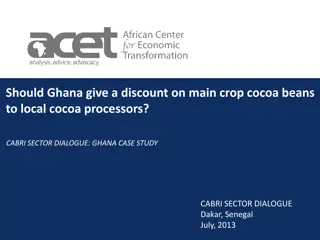Reviving Ghana's Manufacturing Industries for Job Creation
The Ghanaian economy is facing challenges leading to job losses, especially in the manufacturing sector. Reviving industries like GIHOC and addressing the collapse of numerous companies is essential for economic growth and job creation. The Ghana Federation of Labour proposes interventions to support the reindustrialization agenda and emphasizes the urgency of action to prevent further economic decline.
Download Presentation

Please find below an Image/Link to download the presentation.
The content on the website is provided AS IS for your information and personal use only. It may not be sold, licensed, or shared on other websites without obtaining consent from the author.If you encounter any issues during the download, it is possible that the publisher has removed the file from their server.
You are allowed to download the files provided on this website for personal or commercial use, subject to the condition that they are used lawfully. All files are the property of their respective owners.
The content on the website is provided AS IS for your information and personal use only. It may not be sold, licensed, or shared on other websites without obtaining consent from the author.
E N D
Presentation Transcript
24 HOUR ECONOMY, FOCUS ON REINDUSTRIALIZATION AND JOB CREATION PRESENTATION BY: ABRAHAM KOOMSON SECRETARY GENERAL GHANA FEDERATION OF LABOUR
Internal INTRODUCTION The Ghanaian economy has virtually ground to a halt causing massive job losses as a result of systemic failures of economic policies. Extinction of Trade Unions is imminent if the current trend of reckless management of the fragile economy is not reversed.
Internal INTRODUCTION The Manufacturing Industries across all sectors of the economy (formal and informal including business in byproducts) employed not less than 60% of the labour force in the country. The Agro industry apart from food production, served as source of raw materials for the Manufacturing industry i.e. COTTON, TOMATOES, COCOA, TIMBER, MEAT, SUGAR etc.
Internal INTRODUCTION For instance, the GHANA INDUSTRIAL HOLDING CORPORATION (GIHOC) had 17 subsidiary companies which greatly depended on local agric inputs. These Companies were: 1. Vegetable Oil Mill 10.Jute Factory 2. Sugar Products Division, Komenda 11.Pharmaceutical Division 3. Sugar Products Division, Asutsuare 12.Aboso Glass Factory 4. Bolgatanga Meat Factory 13.Paints Division 5. GIHOC FARMS 14.Saltpond Ceramics 6. Meat Products, Tema 15.Tema Steel 7. Paper Conversion Company 16.Boatyards 8. GIHOC Distillery 17.AKASANOMA Electronics 9. GIHOC Footwear
Internal INTRODUCTION Other collapsed or distressed companies: 18. Kade Match Factory 19. Bonsa Tyre 20. Wenchi Tomato Factory 21. SANYO Electronics 22. Food Complex /GAFCO 23. PWALUGU Tomato Factory 24. Vehicle Assembly plant 25. Leather Products 26. Akosombo Textiles Ltd. 27. Tema Textile Ltd 28. Ghana Textile Manufacturing Company Ltd. 29. MILLET Textile 30. Freedom Textile Ltd 31. SPINTEX 32. PRINTEX 33. AQUAFRESH LTD 47.State Fishing 34. GTP 35. JUAPONG TEXTILE 36. Takoradi Flour Mill 37. BLANKET FACTORY 38. NITRA GARMENT 39. Zakour Textile & a host of Garment companies including Glamour Garments, Loyalty. 40. ALU WORKS 41. NESTLE 42. LEVER BROS (UNILEVER) 43. CROCODILE MATCHETS 44. GHANA MATS 45. GHANAL 46. PIONEER Aluminum
Internal INTRODUCTION Looking at the state of the deteriorated economy, revival of these industries cannot happen overnight. However, with the commitment of the NDC as announced by His Excellency the former President John Dramani Mahama, appropriate measures/interventions as being suggested by the Ghana Federation of Labour (GFL) if considered, will hasten the revival of industries across the country to create jobs to enhance the growth of the economy.
Internal GFL OBSERVATION Governments worldwide give premium to the Manufacturing Industry because that is the growth cycle for the development agenda.The manufacturing industry can only grow and produce the expected added value if only the investors have the assurance of investment protection, growth and uninterrupted continuity. Investments in land, plant, machinery and the related equipment for the comprehensive package of the manufacturing business require that the investment needs not less than an assured continuous operational period of 15 to 20 years to recoup, all other things being constant. The current piecemeal granting of a zero Vat for locally manufactured textile product is as good as the uncertainty that characterizes the investment in the industry.
Internal GFL OBSERVATION Government ought to promote investment assurance in the industry, which will as well make the industry competitive. An uninterrupted relief period carries with it the assurance that every investor desires. Imposition of unhealthy and treacherous indirect taxes create unfavourable investment climate. BEVERAGES/ WATER Imposition of outrageous indirect taxes like excise and levies result in high prices of goods and services because such excise/ levies inflate the Vatable base of goods, even those consumed by the school going pre- teen and the teen ages are not proofs of GDP growth but a destruction to the parental financial strength. The recent expanded inclusion of certain products in the excise duty regime by the NPP is noticed to be killing productivity, resulting in laying off of workers, closing down of factories because of very low sales in the face of higher production cost amongst others.
Internal IDENTIFIED CAUSES OF COLLAPSE OF THE INDUSTRIES 1. STATE OWNED ENTERPRISES (SOEs) a. Mismanagement b. Outrageous and nuisance taxes, excise /Levies c. High Utility Tariffs 2. PRIVATE ENTERPRISES a. Outrageous and Nuisance taxes, excise /Levies b. High Utility Tariffs
Internal SUGGESTED APPROACH TO THE SOLUTION Engagement with Industry stakeholders (government /private Investors/AGI) to discuss and adopt Tax and Tariff policies that will benefit the State and businesses as well. GFL PROPOSALS /INPUTS FOR THE NDC MANIFESTO TEXTILES Uninterrupted Zero VAT for Locally Manufactured Textile Industries BEVERAGES/ WATER Reversal of the recently expanded inclusion of certain products in the excise duty regime to sustain operations of the local Manufacturing Industries.
Internal CONCLUSION GFL is of the view that, a boost to the Manufacturing Industry will no doubt result in the following: A direct growth in the export economy- reduction in the demand for foreign currency, stronger cedi forex relationship. Increase in employment. A very attractive investment environment for foreign direct investment. That the NDC should and can expect all the needed support from GFL and the manufacturing industry.
Internal Thank you
